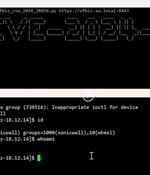Security News

Under certain conditions, attackers can chain a set of vulnerabilities in multiple components of the CUPS open-source printing system to execute arbitrary code remotely on vulnerable machines. [...]

A critical security flaw has been disclosed in the Microchip Advanced Software Framework (ASF) that, if successfully exploited, could lead to remote code execution. The vulnerability, tracked as...

Broadcom on Tuesday released updates to address a critical security flaw impacting VMware vCenter Server that could pave the way for remote code execution. The vulnerability, tracked as...

A now-patched critical security flaw impacting Google Cloud Platform (GCP) Composer could have been exploited to achieve remote code execution on cloud servers by means of a supply chain attack...

A new security flaw has been addressed in the Apache OFBiz open-source enterprise resource planning (ERP) system that, if successfully exploited, could lead to unauthenticated remote code...

Apache has fixed a critical security vulnerability in its open-source OFBiz (Open For Business) software, which could allow attackers to execute arbitrary code on vulnerable Linux and Windows...

A critical security flaw has been disclosed in the WPML WordPress multilingual plugin that could allow authenticated users to execute arbitrary code remotely under certain circumstances. The...

A new zero-day pre-authentication remote code execution vulnerability has been disclosed in the Apache OFBiz open-source enterprise resource planning system that could allow threat actors to achieve remote code execution on affected instances. "The root cause of the vulnerability lies in a flaw in the authentication mechanism," SonicWall, which discovered and reported the shortcoming, said in a statement.

Microsoft Outlook can be turned into a C2 beacon to remotely execute code, as demonstrated by a new red team post-exploitation framework named "Specula," released today by cybersecurity firm TrustedSec. This C2 framework works by creating a custom Outlook Home Page using WebView by exploiting CVE-2017-11774, an Outlook security feature bypass vulnerability patched in October 2017.

Progress Software is urging users to update their Telerik Report Server instances following the discovery of a critical security flaw that could result in remote code execution. The vulnerability, tracked as CVE-2024-6327, impacts Report Server version 2024 Q2 and earlier.